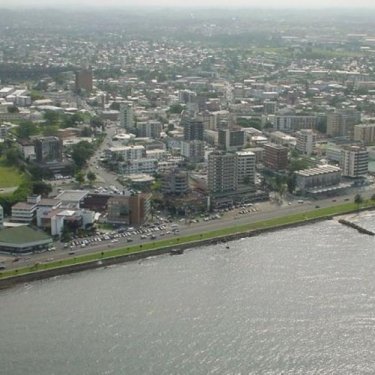Gabonese journalist could spend New Year’s Eve in prison

Reporters Without Borders (RSF) calls for the immediate release of Bertin Ngoua Edou, a satirical newspaper editor who was arrested yesterday in the Gabonese capital, Libreville, and points out that Gabon’s media law, known as the “Communication Code,” has no provision for imprisoning journalists for press offences.
It nonetheless seems as though Edou, who spent last night in a cell at the General Directorate for Investigation, could start the new year in prison.
He was arrested in connection with an article he published in his newspaper, Le Diagnostic, about an alleged corruption case involving Brice Laccruche Alihanga, President Ali Bongo’s former chief of staff, who was recently arrested for misusing public funds, and René Ndemezo Obiang, the current president of Gabon’s Economic, Social and Environmental Council.
When reached by RSF, Edou said he is accused of defamation and spreading false news.
“This journalist’s arrest and detention are illegal because press offences are not punishable by imprisonment under the Communication Code,” said Arnaud Froger, the head of RSF’s Africa Desk.
“If someone thinks an article has defamed them, they have legal recourses, including the media regulator. There is no need to arrest journalists and keep them in detention. We urge the authorities to do whatever is necessary to ensure that this newspaper publisher’s rights are respected and that he does not spend New Year’s Eve in prison.”
Under articles 183 to 186 and 192 to 196 of the Communication Code, which has been in effect since 2017, journalistic offences are punishable by a fine, a media outlet’s suspension or the provisional or definitive withdrawal of its permit, but not by imprisonment.
RSF welcomed the abolition of jail sentences for press offences, but continues to call for revision of the law’s vague wording and imprecise definitions, which allow the Gabonese authorities to restrict press freedom arbitrarily.
Cases of journalists' arrest are rare since the Communication Code took effect two years ago, but RSF has often criticized the High Authority for Communication (HAC), the country’s media regulator, for suspending media outlets arbitrarily.
Newspapers that have expressed the same criticism have paid a high price. They include the newspaper L’Aube, which was suspended for six months in April for publishing an interview with a journalist who criticized “the HAC’s extraordinary persecution of clearly targeted newspapers.”
The HAC, which some Gabonese media outlets have dubbed the “AXE,” slapped a three-month suspension on Gabonreview, one of the country’s most popular news sites, in August in reaction to an editorial accusing some of the HAC’s members of “careerism.” Although the three months are now up, the HAC continues to block access to the Gabonreview site within Gabon on the grounds that it did not stop publishing during the suspension.
A member of the Gabonreview staff told RSF that, as a result of the sanction and the blocking of the website in the country, it has lost more than half of its 45,000 daily unique visitors and nearly 15,000 euros in advertising.
During a political dialogue with Gabon in Libreville in mid-December, the European Union described the HAC’s sanctions as “disproportionate and detrimental.”
Gabon is ranked 115th out of 180 countries inRSF’s 2019 World Press Freedom Index.



